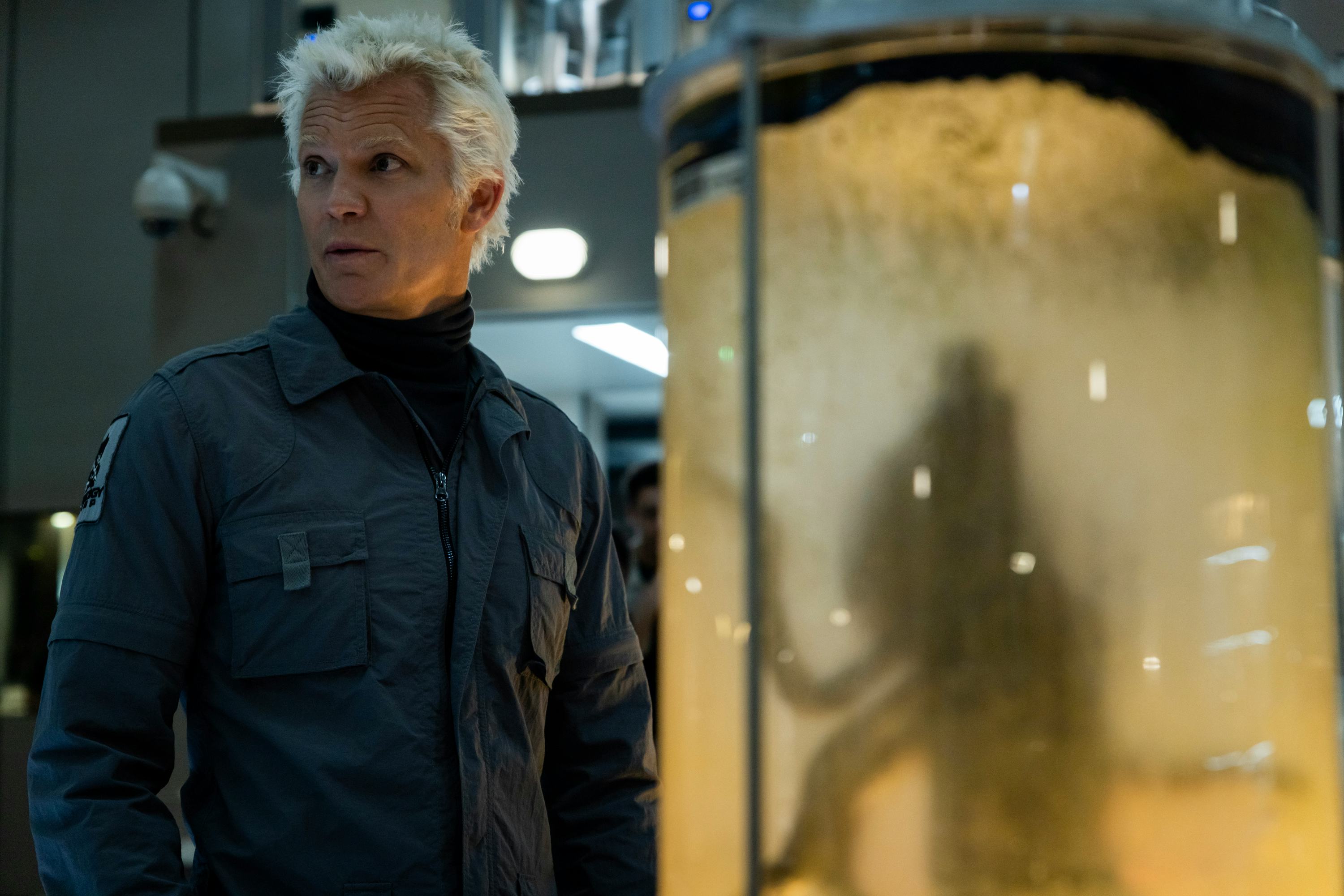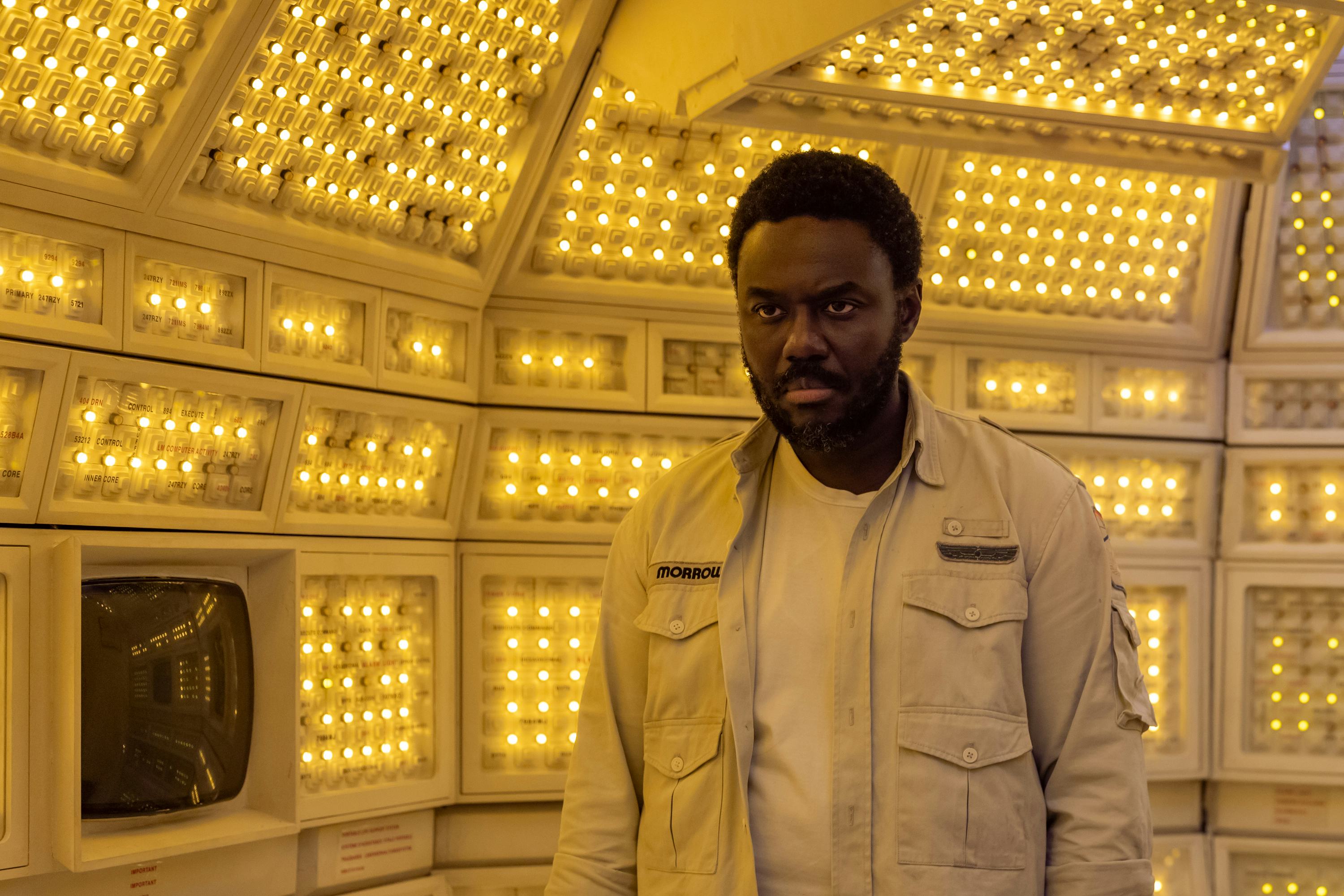
It’s clear from the get-go of Alien: Earth that Noah Hawley really wanted to make an Alien movie. The FX show’s evocative opening scenes, which take place on a Weyland-Yutani deep-space research vessel that is transporting back some dangerous “specimens” back to Earth, could have been lifted straight out of Alien, albeit with totally different characters. Hawley and his production designers meticulously recreate the grimy, claustrophobic corridors of Ridley Scott’s 1979 classic, along with the stark, clinical look of the Hypersleep Chamber and the MU-TH-UR console room. The ship is full of inky shadows and dank, dirty corners that provide the perfect hiding spots for many a xenomorph when all hell inevitably breaks loose — an image compounded by frantic, disturbing flashes of the ship’s residents getting mauled by increasingly unsettling alien creatures.
The rest of the show is equally stunning, painting a futuristic world where billionaire tycoons hide away in damp, tropical oases while the rest of humanity trudges through crowded metropolises populated by towering, crumbling skyscrapers. But a stunning aesthetic can’t wholly carry a series that ultimately falls short of its lofty ambitions.

A prequel to Alien that isn’t really a prequel, Alien: Earth very much falls in line with the TV spinoff formula that won Hawley accolades and acclaim with shows like Fargo and Legion. It’s not a new Alien installment as much as it is Hawley’s interpretation of Alien, with the writer-director taking the sci-fi franchise’s recognizable beats — xenomorphs, synths, the evils of capitalism — and putting his own spin on it. There are your classic face-huggers, yes, but Hawley introduces a whole cornucopia of creepy-crawlies whose horrifying designs recall the eldritch terrors that formed the basis of Scott’s original film. The oppressive greed of Weyland-Yutani is on display here, but Hawley populates his world with even more ruthless corporations vying for dominion over humanity (five, to be exact).
But the synthetics get the biggest upgrade in Alien: Earth, with the show introducing a new type of life-form in the “hybrids” — a life-form that contains a human consciousness in a synthetic body. Our protagonist of the series, Wendy (Sydney Chandler), is one such hybrid, the first of a pioneering experimental trial by Prodigy, the disruptive new corporation on the scene, led by arrogant young genius Boy Kavalier (Samuel Blenkin). Wendy is part of a group of terminally ill children whom Prodigy scouted for this experiment, given the chance to essentially achieve immortality by gaining new, unbreakable bodies with superb intellect and strength. Those bodies are put to the test when the Weyland-Yutani research vessel crashes in a Prodigy city, endangering Wendy’s brother Hermit (Alex Lawther), who is a medic on the search and rescue team sent to the crash site. Wendy convinces Boy Kavalier to send her and the group of hybrids to the crash site, under the supervision of Boy’s stern synth Kirsh (Timothy Olyphant). What they discover there has the potential to tip the balance of the corporate ruling class… or unleash a devastating alien invasion on Earth.

It’s a tantalizing start for an Alien show. An exploration of transhumanism and identity told alongside a tense alien-invasion saga? It sounds like the kind of heady, ambitious storytelling that Hawley excels at. Unfortunately, Alien: Earth gets so caught up in aping the iconic imagery and tense horror thrills of Ridley Scott’s Alien that it never follows through on its most interesting ideas. The result is a series that is visually impressive and tense, but is ultimately narratively and thematically hollow, full of half-baked characters that range from annoying to straight-up unlikable.
But, you might ask, isn’t that kind of what an Alien movie is? In the broadest sense, yes: you mostly watch them to see aliens brutally tear apart everyone except for Ripley. Human characters are not made to be likable; they’re simply cannon fodder. Or, if you’re looking at Scott’s more nihilistic prequels, they’re imperfect creations intended to be destroyed by their unfeeling creators. And while Alien: Earth attempts to present its own likable heroine in Chandler’s doe-eyed Wendy, it feels like it takes the most surface-level reading of Alien and doubles down on it, presenting us with all the nihilism and none of the reasoning behind it.
It’s Hawley’s greatest strengths and weaknesses working against him: Where Hawley riffing off of the Coen Brothers’ signature style in Fargo bore him fruit for five seasons because he was given so much space to create his own characters and narrative within the directive of a Coen “vibe,” Alien: Earth is too indebted to the franchise that Ridley Scott created. The series is at its best when it’s directly riffing off of Alien, with its nail-biting sequences of xenomorph attacks and dread-filled scenes of alien creatures stalking various characters. The staging of the action is thrilling and visually stunning, while the new creatures that Hawley and his team invent for the show are truly terrifying. But his characters are opaque and frustrating to the point that Alien: Earth more frequently recalls Hawley’s failed directorial effort, Lucy in the Sky. And its lofty ideas about transhumanism are abandoned in favor of a few more (admittedly incredible) massacres.

It’s a shame because Alien: Earth has a lot going for it — Chandler gives a promising performance as a child learning to inhabit her new life, while Olyphant gives a wonderfully eerie performance as a stoic synth. But it’s Babou Ceesay as Morrow who is the MVP of this series, dancing between antagonist and sympathetic ally in a way that feels narratively richer than most of the other cardboard characters in the series.
It’s clear that Hawley intends this series to stick around for the long run, with the eight-episode first season (which critics received all episodes for review) setting up a dense, complicated saga that has the potential to stretch on for at least a few seasons more. But after the momentum of the show’s promising start breaks halfway through the season, the prospect of more of this series and its empty characters starts to feel like a chore. If Alien: Earth is to continue for another season, Hawley will need to focus less on the aliens and bring his gaze back down to Earth.







